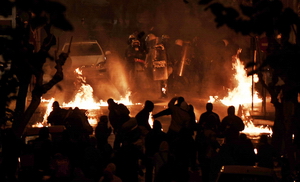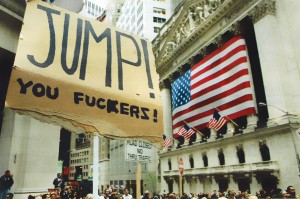Up against the wall motherfuckers! We’ve come for what’s ours…

In these days of rage, spectacle as a power-relation, as a relation that imprints memory onto objects and bodies, is faced with a diffuse counter-power which deterritorialises impressions allowing them to wonder away from the tyranny of the image and into the field of the senses. Senses are always felt antagonistically (they are always acted against something) – but under the current conditions they are driven towards an increasingly acute and radical polarisation.
[print_link]
Against the supposedly peaceful caricatures of bourgeois media (“violence is unacceptable always, everywhere”), we can only cachinnate: their rule, the rule of gentle spirits and consent, of dialogue and harmony is nothing but a well calculated pleasure in beastliness: a promised carnage. The democratic regime in its peaceful façade doesn’t kill an Alex every day, precisely because it kills thousands of Ahmets, Fatimas, JorJes, Jin Tiaos and Benajirs: because it assassinates systematically, structurally and without remorse the entirety of the third world, that is the global proletariat. It is in this way, through this calm everyday slaughter, that the idea of freedom is born: freedom not as a supposedly panhuman good, nor as a natural right for all, but as the war cry of the damned, as the premise of civil war.
The history of the legal order and the bourgeois class brainwashes us with an image of gradual and stable progress of humanity within which violence stands as a sorry exception stemming from the economically, emotionally and culturally underdeveloped. Yet all of us who have been crushed between school desks, behind offices, in factories, know only too well that history is nothing but a succession of bestial acts installed upon a morbid system of rules. The cardinals of normality weep for the law that was violated from the bullet of the pig Korkoneas (the killer cop). But who doesn’t know that the force of the law is merely the force of the powerful? That it is law itself that allows for violence to be exercised on violence? The law is void from end to bitter end; it contains no meaning, no target other than the coded power of imposition.
At the same time, the dialectic of the left tries to codify conflict, battle and war, with the logic of the synthesis of opposites. In this way it constructs an order; a pacified condition within which everything has its proper little place. Yet, the destiny of conflict is not synthesis – as the destiny of war is not peace. Social insurrection comprises the condensation and explosion of thousands of negations, yet it does not contain even in a single one of its atoms, nor in a single one of its moments its own negation, its own end. This always comes heavy and gloomy like a certainty from the institutions of mediation and normalisation, from the left promising voting rights at 16, disarmament but preservation of the pigs, a welfare state, etc. Those, in other words, who wish to capitalise political gains upon the wounds of others. The sweetness of their compromise drips with blood.
Social anti-violence cannot be held accountable for what it does not assume: it is destructive from end to end. If the struggles of modernity have anything to teach us, it is not their sad adhesion upon the subject (class, party, group) but their systematic anti-dialectical process: the act of destruction does not necessarily ought to carry a dimension of creation. In other words, the destruction of the old world and the creation of a new comprise two discrete but continuous processes. The issue then is which methods of destruction of the given can be developed in different points and moments of the insurrection. Which methods cannot only preserve the level and the extent of the insurrection, but contribute to its qualitative upgrading. The attacks on police stations, the clashes and roadblocks, the barricades and street battles now comprise an everyday and socialised phenomenon in the metropolis and beyond. And they have contributed to a partial deregulation of the circle of production and consumption. And yet, they still comprise in a partial targeting of the enemy; direct and obvious to all, yet entrapped in one and only dimension of the attack against dominant social relations. However, the process of production and circulation of goods in itself, in other words, the capital-relation, is only indirectly hit by the mobilisations. A spectre hovers over the city torched: the indefinite wild general strike.
The global capitalist crisis has denied the bosses their most dynamic, most extorting response to the insurrection: “We offer you everything, for ever, while all they can offer is an uncertain present”. With one firm collapsing after the other, capitalism and its state are no longer in a position to offer anything other than worse days to come, tightened financial conditions, sacks, suspension of pensions, welfare cuts, crush of free education. Contrarily, in just seven days, the insurgents have proved in practice what they can do: to turn the city into a battlefield, to create enclaves of communes across the urban fabric, to abandon individuality and their pathetic security, seeking the composition of their collective power and the total destruction of this murderous system.
At this historical conjuncture of crisis, rage and the dismissal of institutions at which we finally stand, the only thing that can convert the systemic deregulation into a social revolution is the total rejection of work. When street fighting will be taking place in streets dark from the strike of the Electricity Company; when clashes will be taking place amidst tons of uncollected rubbish, when trolley-buses will be closing streets, blocking off the cops, when the striking teacher will be lighting up his revolted pupil’s molotov cocktail, then we will be finally able to say: “Ruffians, the days of your society are numbered; we weighted its joys and its justices and we found them all too short”. This, today, is no longer a mere fantasy but a concrete ability in everyone’s hand: the ability to act concretely on the concrete. The ability to charge the skies.
If all of these, namely the extension of the conflict into the sphere of production-circulation, with sabotages and wild strikes seem premature, it might just be because we haven’t quite realised how fast does power decomposes, how fast confrontational practices and counter-power forms of organising are socially diffused: from high school students pelting police stations with stones, to municipal employees and neighbours occupying town halls. The revolution does not take place with prayers towards and piety for historical conditions. It occurs by seizing whatever opportunity of insurrection in every aspect of the social; by transforming every reluctant gesture of condemnation of the cops into a definite strike to the foundations of this system.
Off the pigs!
Monday, December 15, 2008
